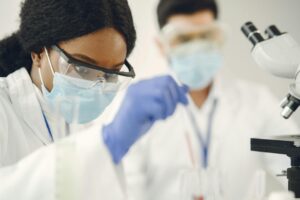How important is chromatography for drug development companies?
Chromatography is a technique used to separate and analyze the components of a mixture. Furthermore, gas chromatography (GC) testing has become a requirement for drug approval. But drug developmet companies are still struggling to reduce their time-to-market because of the inefficiency of analytical instrumentation to be able to detect, identify and classify isomers. Gas chromatography is commonly used in the field of life sciences to analyze biological samples such as proteins, DNA, and enzymes. In this article, we will discuss how chromatography can be used in life science and for isomer detection.
Chromatography testing in life science
In life sciences, chromatography is used to purify and isolate biological molecules such as proteins, DNA, and enzymes. These molecules can be difficult to separate and analyze due to their complex structures and interactions with other molecules. Chromatography allows scientists to separate these molecules based on their physical and chemical properties, such as size, charge, and affinity for the stationary phase.
One important use of chromatography in life science is in the analysis of isomers. Isomers are compounds that have the same molecular formula but a different arrangement of atoms. Isomers can have different physical and chemical properties, making them important to identify and distinguish.

Labio Precision Chromatography products can be used to separate isomers based on their different interactions with the stationary and mobile phase. For example, gas chromatography can be used to separate isomers based on their boiling points, while liquid chromatography can be used to separate isomers based on their size and charge. In summary, chromatography is a powerful technique that is widely used in the field of life science for the analysis and separation of biological molecules. It is particularly useful for the detection and separation of isomers, which can have different physical and chemical properties. By using chromatography, scientists can better understand the complex processes and interactions of biological molecules, leading to advances in fields such as medicine and biotechnology.
The accuracy and reliability of chromatography systems are critical for drug development companies as they rely on these systems to analyze and purify drug candidates. Chromatography is used at various stages of drug development, from the synthesis and characterization of new compounds to the purification of clinical trial materials.
Isomers in drug development
In the early stages of drug development, chromatography is used to synthesize and characterize new compounds. This includes the separation and identification of isomers, which can have different biological activities and potential side effects. By using chromatography, drug development companies can ensure that they are synthesizing and testing the correct isomer and that the compound is pure and free of impurities.
Drug development is the process of discovering and synthesizing new drugs, as well as the testing and regulatory approval of these drugs. It involves a number of different steps, including:
- Identifying a target: This involves identifying a specific biological target or pathway that is involved in a disease or condition that can be targeted by a drug.
- Drug discovery: This involves identifying chemical compounds that can interact with the target in a way that is beneficial for treating the disease or condition. This can be done through a variety of methods, such as high-throughput screening, in which large numbers of chemical compounds are tested for their potential activity.
- Preclinical testing: After a compound has been identified, it is tested in the laboratory and in animals to assess its safety and effectiveness.
- Clinical trials: If a compound shows promise in preclinical testing, it can move on to clinical trials, in which it is tested in humans. Clinical trials are conducted in three phases, each with a specific goal: Phase 1 trials involve a small number of people and are primarily concerned with safety; Phase 2 trials involve a larger number of people and are designed to assess effectiveness and determine appropriate dosages; Phase 3 trials involve an even larger number of people and are designed to confirm the drug’s effectiveness, monitor side effects, and compare the drug to other available treatments.
- Regulatory approval: If a drug is found to be safe and effective in clinical trials, it can be submitted for regulatory approval to the appropriate agency (such as the FDA in the United States). If the drug is approved, it can be made available to the public.
Drug development is a long and expensive process that can take many years and cost hundreds of millions of dollars. However, the ultimate goal is to develop drugs that can improve the health and well-being of people around the world.
As a drug candidate progresses through clinical trials, chromatography is used to purify and isolate the active ingredient for use in clinical trial materials. The purity and identity of the active ingredient must be carefully controlled to ensure the safety and effectiveness of the drug. Chromatography is essential for the analysis and purification of the active ingredient, as well as the detection and removal of impurities.
In addition to its use in drug development, chromatography is also important for quality control and regulatory compliance. Drug development companies must demonstrate the purity, identity, and potency of their drug candidates to regulatory agencies such as the Food and Drug Administration (FDA). Chromatography is a key tool for meeting these requirements and ensuring that drug candidates meet the necessary standards for safety and efficacy.
In conclusion, chromatography is a vital tool for drug development companies, as it allows them to accurately and reliably analyze and purify drug candidates at various stages of development cost-effective with the right product solution. The accuracy and reliability of LABIO GC-UV systems are crucial for the safety and effectiveness of drugs, as well as regulatory compliance.




